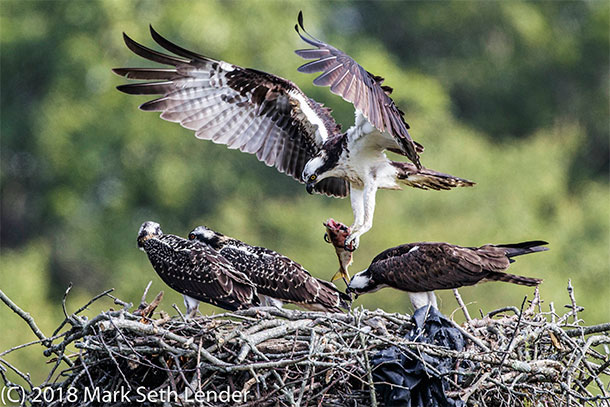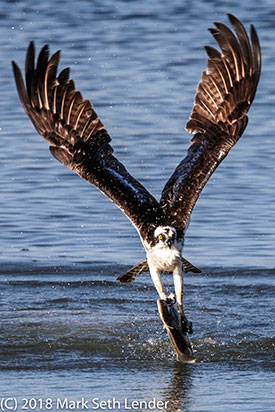What The Osprey Overheard: Mark Seth Lender
Air Date: Week of July 27, 2018

No drones needed for this delivery. (Photo: Mark Seth Lender)
As new osprey parents feed and care for their young, even the faintest of sounds – like a distant plane – seem a threat to the youngsters. Living on Earth’s Resident Explorer Mark Seth Lender watches as the ospreys keep a watchful eye, and ear, on their surroundings, and muses on how noisy the human world must be to them.
Transcript
BASCOMB: Osprey have made a remarkable comeback in the last 50 years. But it’s not all smooth sailing – or fishing. Warming waters and massive overfishing by humans alter fish stocks – global events that osprey will have to deal with. But that’s not all. As Mark Seth Lender, Living on Earth’s Explorer-in-Residence, can testify, there is another pressing issue in the air…
LENDER: The marsh goes as far as the river, breaks there, then continues North spreading in all directions for more than two miles, bordered by woods that are dotted with houses. Before the river is an osprey nest that has been there for years, weathered and leaning now. And to the South towards the sea, the storm-slashed remains of sand dunes. The waves run up to the dunes like someone talking in a low voice, muttering to themselves, the one-sided conversation lost on the wind.
An osprey arrives carrying a sanddab. High up he dips and calls announcing his prowess, fisherman and provider. Then lands somewhere out of sight. Now he comes to the nest. The head of the sanddab is already gone, which should be enough, but he cannot part with the rest and leaves his mate without sharing. And comes back. And leaves again. The female sitting on her eggs, blotchy markings like oversized age spots, hardly reacts. She is used to this. He just cannot make up his mind…

An osprey scores a catch. (Photo: Mark Seth Lender)
Two months later, and his mind is inevitably made up for him.
All three fledglings have survived. Every few days they have doubled in size and corresponding appetite. It is constant. As if he himself is being torn apart, like the sea robin he just brought them and that they now slowly rip to pieces. Now he must wait on tide, weather, the things that fish think, that are important to them, and determine where they will be. And when. And how long. Nothing is up to him. All he can do is comply. And somewhere in between he himself must eat.
And he is off again, over the merciless sea. He hovers, moves on, hovers again, and again, the water beneath filed to a grainy opacity by an offshore breeze.
Waiting on the nest, the female, inexplicably, begins her alarm call:
Yat tat tut… Yat tat tut-tut…
There is nothing nearby, not below or above her. The complaint grows. Now she is in full throat, loud and nearly continuous.
The fledglings move about in the nest.
Still nothing…
There. There it is.
A small plane high above the river.
Long before it appeared she heard it. After it vanishes from sight she will still hear it still. How loud this world must be to her, the world we have made all around her.
[MUSIC: “Spiderman” soundtrack, “Academic Decommitment”]
BASCOMB: That’s Mark Seth Lender, Living on Earth’s Explorer in Residence.
Links
Living on Earth wants to hear from you!
Living on Earth
62 Calef Highway, Suite 212
Lee, NH 03861
Telephone: 617-287-4121
E-mail: comments@loe.org
Newsletter [Click here]
Donate to Living on Earth!
Living on Earth is an independent media program and relies entirely on contributions from listeners and institutions supporting public service. Please donate now to preserve an independent environmental voice.
NewsletterLiving on Earth offers a weekly delivery of the show's rundown to your mailbox. Sign up for our newsletter today!
 Sailors For The Sea: Be the change you want to sea.
Sailors For The Sea: Be the change you want to sea.
 The Grantham Foundation for the Protection of the Environment: Committed to protecting and improving the health of the global environment.
The Grantham Foundation for the Protection of the Environment: Committed to protecting and improving the health of the global environment.
 Contribute to Living on Earth and receive, as our gift to you, an archival print of one of Mark Seth Lender's extraordinary wildlife photographs. Follow the link to see Mark's current collection of photographs.
Contribute to Living on Earth and receive, as our gift to you, an archival print of one of Mark Seth Lender's extraordinary wildlife photographs. Follow the link to see Mark's current collection of photographs.
 Buy a signed copy of Mark Seth Lender's book Smeagull the Seagull & support Living on Earth
Buy a signed copy of Mark Seth Lender's book Smeagull the Seagull & support Living on Earth

